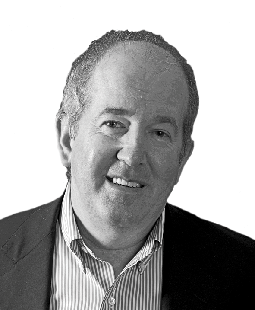BIO 2014 Takeaway: The Peace Dividend
A surprising take away from the BIO International Convention in San Diego last month is the stark contrast between cooperative industry engagement and an unstable geopolitical order marked by xenophobia,

William Looney
A surprising take away from the BIO International Convention in San Diego last month is the stark contrast between cooperative industry engagement and an unstable geopolitical order marked by xenophobia, drift and active, often violent government disengagement from the hard work of building common ground.
While BIO held 29,000 partnering meetings over four days, convened the first meeting of a new 20-member International Council of Biotech Associations (ICBA), and launched an industry-wide commitment to fighting anti-microbial resistance, Convention keynoter Hillary Clinton spent all but six minutes of her 90-minute issues tour d’ horizon covering the sad breakdown of good governance and peaceful dialogue in virtually every area of public life.
With the state-sponsored sectarian implosions in the Middle East as the main topic, there was little time to talk about all the new science that promises to preserve and extend life-that is, assuming biotech gets the predictable, risk-deflecting operating environment it needs to wait out those long product development cycles.
Consider, however, if current events had allowed BIO to change the conversation with our likely 2016 presidential candidate. Instead of the nuclear option in Iran, how about the public health meltdown in the Middle East caused by the uncontrolled spread of diabetes? One of every 10 adults in the region is now a diabetic, a figure slated to grow to two in ten by the next decade. Some countries, like Saudi Arabia, are already there. The region recorded some 400,000 deaths from diabetes last year; more than half the victims were under age 60, reflecting the fact that many young patients go undiagnosed until it is too late.
Governments are aware of the problem, but priorities remain elsewhere. Combined public and private outlays on diabetes in the region totaled $12 billion in 2012, a small fraction of the nearly $120 billion spent on arms purchases. Significantly, experts attribute the prevalence of the disease and its many comorbidities to the region’s damaged infrastructure-in both physical and cultural terms-and the pressure this puts on the stability of families and community. This is reflected in statistics showing that the Middle East has among the world’s worst record in drug adherence, with some 70% of patients cycling off a new medicine only four months after the initiation of treatment due to lack of follow-up.
The fact that gets no traction is BIO members have a solution to this and other critical public health challenges. For diabetes, it is biologic therapies promising tighter glucose control, a better safety profile and more patient convenience-with a potentially big payoff from higher rates of adherence to treatment. Industry researchers are also examining the links between type 2 diabetes and stress-related hormones such as cortisol. This is uniquely suited to the Middle East’s distinct profile on population health. Millions of otherwise healthy people are suffering from stress due to sectarian strife and randomized violence on a daily basis, not to mention the disruptive effects of urbanization, gender inequities, and other cultural and religious barriers.
The cancer of poor global governance also weighed on BIO’s efforts to showcase emerging country markets as a source of future medicines growth and innovation. The grease behind that wheel is captured in one word: partnership. Government officials from country after country touted this, at least in shorthand. However, conducting a partnership dialogue in full paragraphs depends on a punctuated, no-exception commitment to private enterprise and open borders, in finance, information, and especially in people.
A big unknown is how much Russia’s budding pharma potential has been driven off course by the country’s sudden militaristic push for territorial realignment on ethnic rather than economic lines. There is some government money and a small private sector with expertise in promising fields like regenerative medicine and nanotechnology. Building this base requires extra lift in the form of more foreign multinational expertise, as well as persuading the huge brain drain of experienced researchers from the Yeltsin-era diaspora to return to Russia: but for what?
The critical draw is not more government aid or philanthropy. Instead, it’s a good commercial opportunity, one that requires a market-incentivized governance structure free of the internventionist distractions that reward brawn more than brains.
Today, there are too many examples of how divisive, dysfunctional governance erodes human potential. It is not a discussion limited to dictatorships. The implications are especially harsh in biopharmaceuticals, one of the few industries with a social impact far beyond its own area of expertise. To me, the message that resonates from BIO 2014 is: let the innovators in this industry do their job!
Addressing Disparities in Psoriasis Trials: Takeda's Strategies for Inclusivity in Clinical Research
April 14th 2025LaShell Robinson, Head of Global Feasibility and Trial Equity at Takeda, speaks about the company's strategies to engage patients in underrepresented populations in its phase III psoriasis trials.
Beyond the Prescription: Pharma's Role in Digital Health Conversations
April 1st 2025Join us for an insightful conversation with Jennifer Harakal, Head of Regulatory Affairs at Canopy Life Sciences, as we unpack the evolving intersection of social media and healthcare decisions. Discover how pharmaceutical companies can navigate regulatory challenges while meaningfully engaging with consumers in digital spaces. Jennifer shares expert strategies for responsible marketing, working with influencers, and creating educational content that bridges the gap between patients and healthcare providers. A must-listen for pharma marketers looking to build trust and compliance in today's social media landscape.
Pfizer, GSK Gain ACIP Recommendations for RSV and Meningococcal Vaccines
April 18th 2025The Centers for Disease Control and Prevention’s Advisory Committee on Immunization Practices voted to expand access to Pfizer’s respiratory syncytial virus vaccine Abrysvo for high-risk adults in their 50s and voted in favor of GSK’s meningococcal vaccine, Penmenvy, for streamlined adolescent protection.